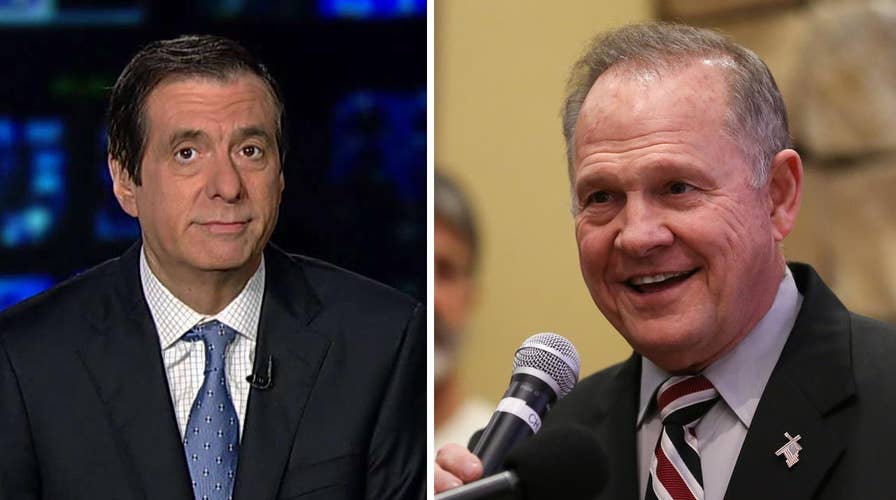Kurtz: Has shock worn off from Moore allegations?
'MediaBuzz' host Howard Kurtz weighs in on why Trump and Republican leaders are now backing Roy Moore.
When the allegations of sexual misconduct against Roy Moore were first published, President Trump was quick to distance himself.
While a "mere allegation" should not be allowed to destroy someone's life, Sarah Huckabee Sanders said in a statement, "the president also believes that if these allegations are true, Judge Moore will do the right thing and step aside."
Mitch McConnell said that if Moore won the Senate seat in Alabama, he would face possible expulsion. "If he were to be sworn in," the majority leader said at a Wall Street Journal forum, "he would immediately be in a process before the Senate Ethics Committee." Moore would be "asked to testify under oath" in what would probably be "an unprecedented beginning."
And the Republican National Committee quickly yanked its financial support.
That was then.
On Monday, Trump formally endorsed Moore in a phone call to the former judge. "Democrats refusal to give even one vote for massive Tax Cuts is why we need Republican Roy Moore to win in Alabama," the president tweeted.
McConnell dropped the expulsion talk, which was designed to force Moore out of the race. He now says Alabama voters should "make the call" on sending him to the Senate.
And the RNC has restored its financial support.
What happened?
How did GOP leaders flip back in Moore’s direction in just three weeks, in the home stretch before the Dec. 12 special election? After all, nine women have accused Moore of sexual misconduct or dating them when they were teenagers, one as young as 14. Moore vehemently denies the allegations.
Many in the Republican Party were appalled by the women’s accounts and hoped to force Moore out of the race. But he owed nothing to the establishment that opposed him in the primary, and once the race against Democrat Doug Jones became more competitive, Republicans began to worry about losing what should be an incredibly safe seat.
In effect, Moore’s strategy of denial and delay worked. Allegations that seemed shocking and beyond the pale when they first surfaced gradually became part of the political background noise. Moore dismissed the accusers, attacked the Washington Post for carrying some of their stories and questioned why it took nearly four decades for their accounts to surface.
When John Conyers and Al Franken faced their own sexual misconduct allegations, the atmosphere subtly shifted, as this was no longer an exclusively Republican problem. The 88-year-old Conyers announced his resignation yesterday after mounting sexual misconduct allegations, a week after one accuser, his former deputy chief of staff, went on the "Today" show.
The delay strategy has worked before, most notably for Bill Clinton in 1998. If Clinton had admitted to a sexual relationship with "that woman" when the Monica Lewinsky story broke, he probably would have been forced to resign. The country was horrified by a president being involved with an intern and apparently lying about it. But when his grand jury testimony came seven months later, many Americans had grown tired of the saturation media coverage and the White House attacks on Ken Starr took their toll. The House still impeached Clinton on a party-line vote, but there was never much doubt that the Senate would acquit him.
In the Moore case, not all Republicans are on board, and that includes his fellow Alabama senator Richard Shelby. Mitt Romney said that having Moore in the Senate would be "a stain on the GOP and on the nation."
One of Moore’s accusers, Debbie Wesson Gibson, who says she dated Moore when she was 17, showed the Washington Post a signed high school graduation card she received from him. Moore once acknowledged knowing Gibson as a "friend," but now maintains he doesn’t know any of his accusers.
What we are seeing here is cold political reality. As the stories of the women have faded from the headlines, Roy Moore is very likely going to win next week's election. Trump had already been unofficially helping him by attacking Jones as a tax-and-spend liberal. The RNC does whatever the president wants. And McConnell, in taking a hands-off approach, must have realized that expulsion is unlikely.
The bottom line: In a CBS poll (which gives Moore a 6-point lead), 71 percent of likely Republican voters say the misconduct allegations against him are false. And of that group, 92 percent say the Democrats are behind the charges, and 88 percent say newspapers and the media are behind them. About half of Moore supporters say their vote is to support Trump.
And that’s why the president and his party are changing their stance on the controversial candidate.





